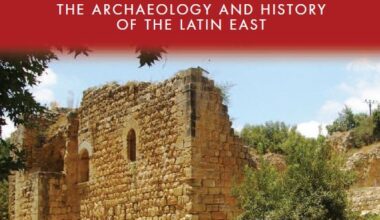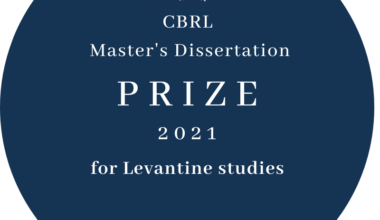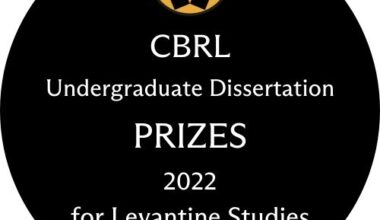We are thrilled to announce the winners of CBRL’s 2019 prize for the Best Article submitted to Contemporary Levant has been awarded to co-authors Shatha Abu-Khafajah (Hashemite University) and Riham Miqdadi (United Arab Emirates University) for their paper entitled: Prejudice, military intelligence, and neoliberalism: Examining the local within archaeology and heritage practices in Jordan.
The committee also awarded the 2019 CBRL Prize Honourable Mention to Lauren Banko’s article, A stranger from this homeland’: deportation and the ruin of lives and livelihoods during the Palestine Mandate was recognised for its originality, empirical richness and compelling analysis of the impact of bordering policies on colonial citizenship and its denial in the context of British mandate Palestine.
The evaluating committee, made up of members of CBRL trustees and Contemporary Levant’s editorial board, selected the winning article for its multi-disciplinary relevance, the originality of the research and the impact of its arguments within the region and beyond.
Michelle Obeid, Contemporary Levant’s Editor-in-Chief commented on the paper: ‘This programmatic article interrogates neoliberal governance practices of “participation” in the context of heritage discourses in Jordan and skilfully highlights how dominant agendas continue to be driven by foreign “experts”. The article is a worthwhile critique that sees archaeological research and heritage work as a form of neocolonialism. Its ambitious scope has the potential to shake up “passive and descriptive” approaches to archaeology in the region.’
The winning article will be available open access once published later this year.
Here is an abstract of Shatha and Riham’s paper:
The contemporary scene of heritage projects in the neoliberal context of Jordan is dominated by one theme: sustainable development on the basis of participatory approach. While this approach is understandably celebrated on academic and governmental levels, very little is done to examine its history and the power dynamics within which it operates. Breaking from the local academic tradition based on passive and descriptive approach to archaeology and heritage, we aim to establish a theoretical framework to examine why and how, in the field of archaeology and heritage, the local communities of the Arab region moved from the peripheral to the centre, and from the background to the foreground in the times between colonialism and neoliberalism. Drawing on our observations – as local students and then as scholars in the field of archaeology and heritage in Jordan since 1992 – and analysis of the academic/ industrial filed of archaeology and heritage, we examine the power dynamics that governs the field. We situate archaeology and heritage within the consecutive contexts of colonialism and neoliberalism as umbrella concepts and practices that govern the relationship between the West and the Arab region. While the first part of the article examines the exclusion effect of colonialism, the second part investigates the inclusive dynamics of neoliberalism within archaeological and heritage sites/ projects in Jordan. Despite the obvious difference of approach between the two contexts they both managed to make substantial shifts in the perception of, and attitudes toward, archaeology and heritage that are always coming from the outside, and always operating on sites and peoples alike.
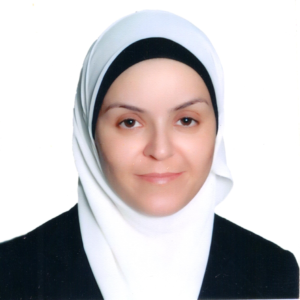 Shatha Abu-Khafajah graduated as an architect from the University of Jordan in 1997. She specialized in documentation and conservation of archaeological heritage while doing her master’s degree in archaeology. Her PhD in cultural heritage management from Newcastle University, acquired in 2007, enabled her to synthesise architecture and archaeology with special interest in establishing a sustainable approach to heritage management in the Arab region that is community-based and context-oriented. She is currently an associate professor at the Hashemite University in Jordan.
Shatha Abu-Khafajah graduated as an architect from the University of Jordan in 1997. She specialized in documentation and conservation of archaeological heritage while doing her master’s degree in archaeology. Her PhD in cultural heritage management from Newcastle University, acquired in 2007, enabled her to synthesise architecture and archaeology with special interest in establishing a sustainable approach to heritage management in the Arab region that is community-based and context-oriented. She is currently an associate professor at the Hashemite University in Jordan.
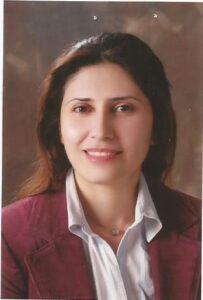 Riham Miqdadi obtained her BA and MA degrees in Archaeology from Mo’tah University and University of Jordan respectively. She pursued her PhD degree in Near Eastern Archaeology from University of Tübingen in Germany. Riham participated in several archaeological excavations in Jordan and Syria. She is currently an assistant professor at the Department of History and Archaeology in the United Arab Emirates University. Her research focuses on ancient near eastern archaeology, Arabian Gulf archaeology, typology of the ancient pottery and manufacturing techniques, and cultural heritage studies and practices.
Riham Miqdadi obtained her BA and MA degrees in Archaeology from Mo’tah University and University of Jordan respectively. She pursued her PhD degree in Near Eastern Archaeology from University of Tübingen in Germany. Riham participated in several archaeological excavations in Jordan and Syria. She is currently an assistant professor at the Department of History and Archaeology in the United Arab Emirates University. Her research focuses on ancient near eastern archaeology, Arabian Gulf archaeology, typology of the ancient pottery and manufacturing techniques, and cultural heritage studies and practices.
Contemporary Levant is a peer-reviewed, multi-disciplinary journal that aims to foster research on contemporary politics, society and culture in the Levant region, its diasporas and neighbouring countries. The journal seeks to maintain a balance between empirical research and theoretical developments.
To find out more about submitting your work, please visit www.tandfonline.com/ycol. You can subscribe to Contemporary Levant through university library subscriptions and by becoming a member of CBRL.













